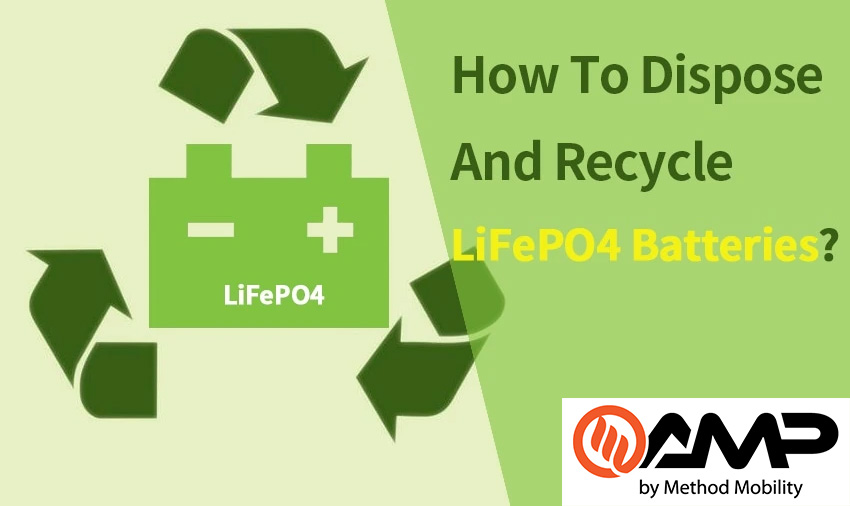While you won’t have to consider recycling your AMP battery for a few years, it is important to understand how to dispose of a LiFePO4 battery if the need arises.
As the world embraces sustainable practices, it becomes crucial to properly manage and recycle lithium iron phosphate (LiFePO4) batteries. This page aims to provide insights into why LiFePO4 battery recycling matters and how it can be done effectively.

Reducing Environmental Impact LiFePO4 batteries offer numerous advantages over other battery chemistries, such as high energy density, longer lifespan, and increased safety. However, like all batteries, LiFePO4 batteries have a limited lifespan and eventually reach the end of their usefulness. Discarding them in landfills or incinerating them can have detrimental effects on the environment. By recycling LiFePO4 batteries, we can prevent hazardous materials from seeping
Recovering Valuable Materials LiFePO4 batteries contain valuable resources like lithium, iron, phosphate, and other metals. These materials can be extracted and reused in the production of new batteries, reducing the demand for fresh mining and preserving natural resources. Recycling LiFePO4 batteries ensures that valuable components are not wasted, contributing to a more sustainable and circular economy.
Promoting Sustainability In a world striving for sustainability, proper LiFePO4 battery recycling plays a vital role. By recycling these batteries, we conserve resources, reduce energy consumption, and minimize greenhouse gas emissions associated with the extraction and production of raw materials. Recycling LiFePO4 batteries aligns with the principles of a greener future and contributes to a cleaner and healthier planet for future generations.
Locate a Recycling Center To recycle LiFePO4 batteries, start by finding a local recycling center or a dedicated drop-off point. These facilities specialize in the safe and environmentally friendly disposal of batteries, ensuring that hazardous materials are properly handled.
Battery Preparation Before recycling, it is essential to prepare LiFePO4 batteries properly. This involves fully discharging the battery, disconnecting it from any devices or power sources, and protecting the terminals to prevent short-circuits during transportation.
Recycling Process Once the LiFePO4 batteries reach the recycling facility, they undergo a thorough process. The batteries are dismantled, and the valuable materials, including lithium, iron, and phosphate, are extracted. These recovered materials are then purified, refined, and transformed into usable raw materials for the manufacturing of new batteries or other applications.
Environmental Responsibility By recycling LiFePO4 batteries, you are actively participating in environmental responsibility. Ensure that you follow local regulations and guidelines for battery recycling, as they may vary depending on your region. Together, we can make a significant impact on the environment and create a sustainable future.
In conclusion, recycling LiFePO4 batteries is not only an environmentally responsible choice but also a way to contribute to the development of a sustainable society. By recycling these batteries, we can minimize environmental impact, recover valuable materials, and promote a circular economy. Join us in this crucial effort to create a cleaner and healthier planet for generations to come.
Together, let’s embrace the importance of LiFePO4 battery recycling. Join us in making a difference by recycling your LiFePO4 batteries at a local recycling center and spreading awareness about the benefits of responsible battery disposal. Let’s work towards a greener future, one LiFePO4 battery at a time.